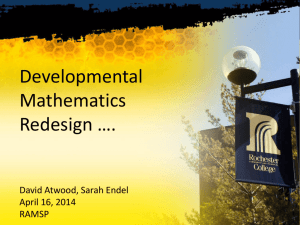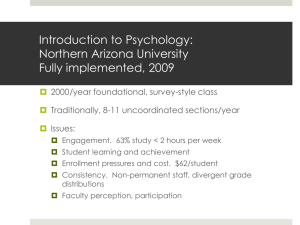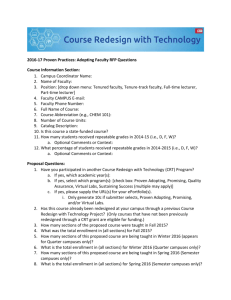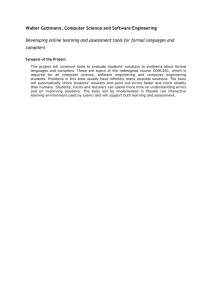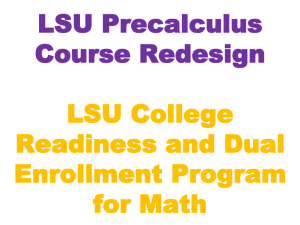Raid Amin - National Center for Academic
advertisement
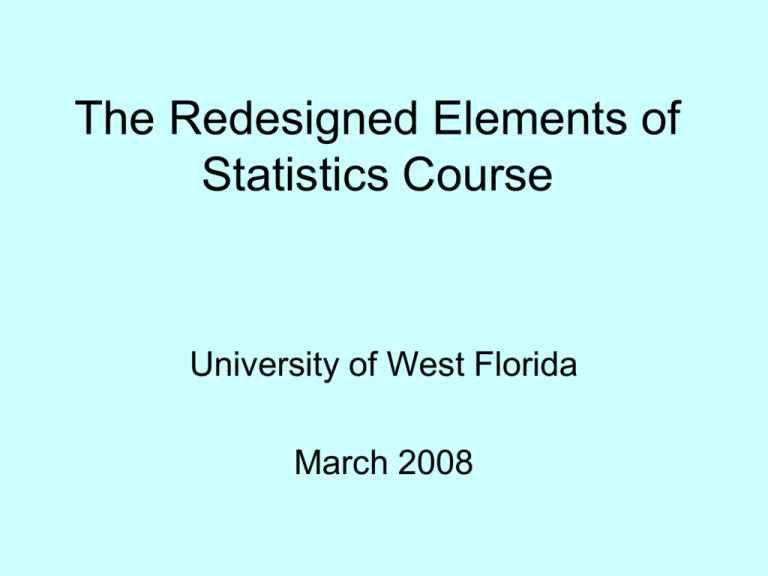
The Redesigned Elements of Statistics Course University of West Florida March 2008 Problems • The traditional course did not address the broad range of differences in student learning styles and quantitative skills. • It also did not encourage active learning or offer the opportunity for hands-on experience with computer aided data analysis. • The past structure heavily depended on help from the Math Lab's teaching assistants who often have undergraduate degrees in general math or science fields, limiting the effectiveness of statistics instruction they can provide. • Students did not receive sufficient individual attention due to a lack of adequate tutoring assistance. • Most importantly, students were not motivated to work continuously throughout the semester. They studied when they felt they must. During the past three academic years, about 28% of the students performed very poorly, earning a D (5%), F (8%), or W (late drops, 15%) Model • • • • UWF's redesign, using the Replacement Model, centers on student learning. It is interactive, providing one-to-one assistance for students and enabling greater hands on experience. The number of sections has been reduced from 10 to 4. This course redesign reduces the weekly lectures to one per week, changing all but one fully online lecture to computer-aided lab work by adding HAWKES, an intelligent tutoring system. In fall 2007, HAWKES was pilot tested in the redesigned large section while the remaining sections stayed face to face. The HAWKES system teaches statistical concepts interactively. It also provides students with much needed practice and feedback when solving problems. Students can choose their own learning pace by adjusting the level setting, challenging them according to their own skill level. This significantly increases active learning which is one of UWF's institutional goals. Following the fall 2007 pilot, a full implementation is scheduled for spring 2008. Student success rates and the quality of student learning should improve Current Status • • Instruction Methods The redesigned course meets only once a week for a face to face instruction session, in place of the traditional twice a week approach in traditional courses. The use of technology, such as SmartBoard, Tablet Laptop, projectors and e-learning allows the instructors to cover an overview of weekly material in one session, while students study with HAWKES and with the assistance of TA’s the remainder of the week, and at their own pace. Overall, response from students has been very positive to such a use of technology in instruction. Departmental Consensus. It was important to inform all faculty members in the department about the new approach in teaching elements of statistics. The plan for the redesigned course was listed in the agenda of all faculty meetings and for several months before the implementation so that discussions could be held and so that agreement could be reached. Since the number of sections are reduced, there was concern by some faculty that summer teaching would be affected and that some instructors would lose the possibility to teach during the summer a statistics course. In addition to the concern about job stability in the summer, there was concern about the extra work required for a successful implementation of the redesigned course. Cost • The redesigned course will reduce instructional costs by decreasing the number of sections from 10 to 4 and increasing section size. Regular faculty involved in teaching the course will be reduced, adjuncts will be eliminated, and course management will be shifted to D2L and HAWKES. An enrollment increase of 4% is also projected. The redesign will reduce the cost-per-student from $214 to $176, an 18% decrease. The savings may be used to redesign other general education courses, enhance upper-level undergraduate and graduate offerings, and provide additional resources for research and service in the department. Were costs reduced as planned? • The expected cost savings for the redesign of elements of statistics have proven to be accurate. The cost planning was based on the assumption that regular full-time faculty teach the redesigned course. If temporary instructors or adjuncts will teach the redesigned course, it is expected that the cost savings will significantly less. The redesign process at the University of West Florida is still in the early stages, and more time is needed to better assess cost savings or increase. Student Results • • • • • • • • Improved Learning In the redesigned course, the HAWKES learning system uses exam questions that are designed to test basic concepts of statistical techniques and methodologies. The final exam questions are designed to measure overall understanding of the subject matter, which covers all expected student outcomes for the course. The team concludes that students in the redesigned course performed slightly better than students in a corresponding traditional statistics course based on an overall performance analysis of the grade distribution in the comprehensive final examination. Improved Retention The team concludes that in the pilot section of the redesigned course, the DFW rate was 15% compared to 18% in the corresponding traditional course. Other Impacts on Students It was observed that the class room atmosphere was more positive and cheerful in the redesigned section when compared to the section taught with the traditional teaching methods. Students were clearly “happier” to be enrolled in the redesigned course. The use of the HAWKES learning system was instrumental in getting students better engaged in the course. Such engagement is known to be a major factor in successful student learning. Student class attendance was over 90% in the redesigned course, whereas attendance levels for the traditional course was lower. Better attendance rates can be explained by the more positive class atmosphere. Students seem to be more relaxed.
